Community Education Health & Wellness Sports
Love of sports and teammates’ support helped Peninsula’s Clark beat cancer
Toward the end of his sophomore wrestling season at Peninsula High School, Boden Clark started noticing some unusual bone pain.
Community Sponsor
Community stories are made possible in part by Peninsula Light Co, a proud sponsor of Gig Harbor Now.
It’s wrestling. Pain is part of the deal. He figured it was no biggie.
Then his cardiovascular fitness started to lag, bizarre for a highly active two-sport athlete who prides himself on being in great shape.
“We figured it was just like cutting weight,” said his mom, Trulie Helgerson, referring to the wrestling practice of trying to qualify for a weight class. “Cutting weight’s no fun, right?”
He broke three ribs during a tournament and they just wouldn’t heal. His nose bled constantly. Fatigue, beyond what’s normal during wrestling season, overwhelmed him.
Clearly, something wasn’t right.
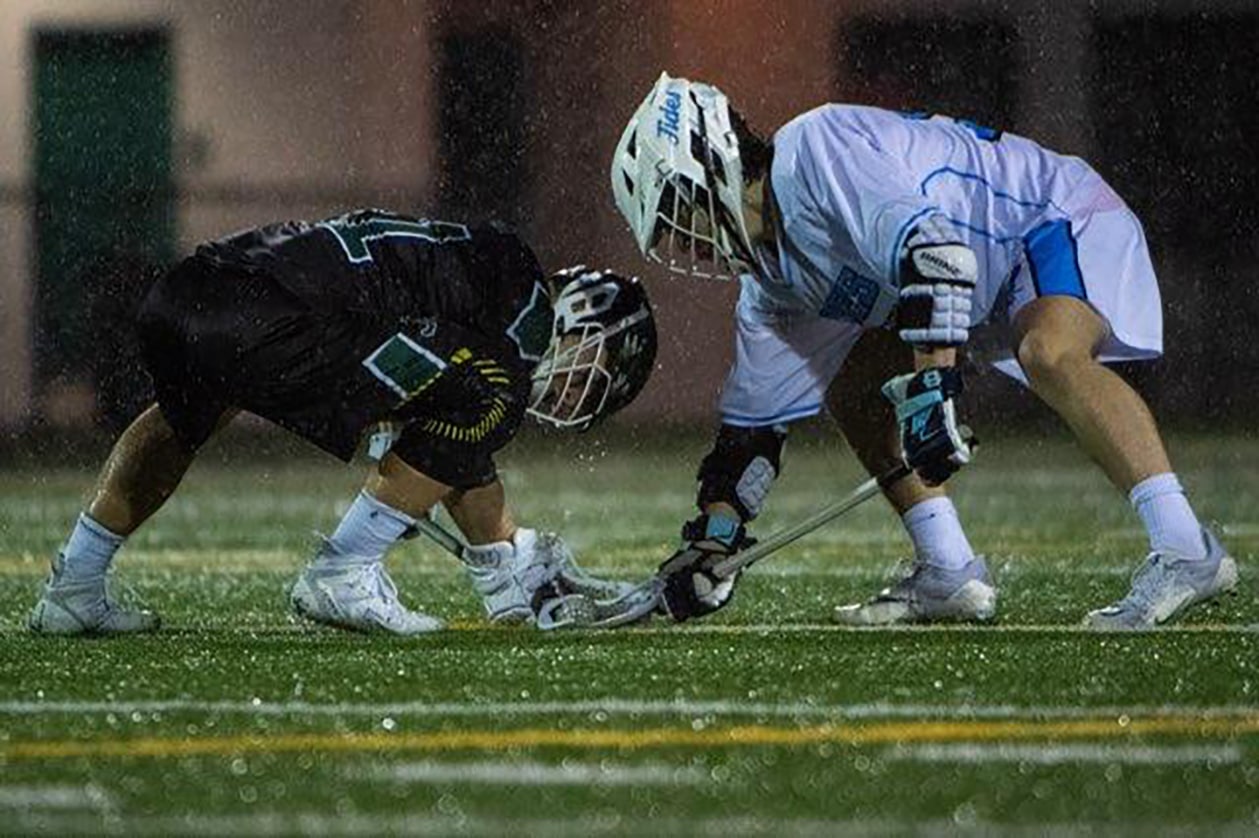
Boden Clark battles in a faceoff against a Gig Harbor player during a meeting earlier this year. Photo by Bryce Carithers
Diagnosis
In spring 2020, doctors diagnosed Clark with acute lymphoblastic leukemia. It’s a blood cancer that mainly afflicts the young and the old, according to the American Cancer Society.
Doctors told Boden and his family that ALL is both one of the most aggressive forms of cancer but also one of the most survivable, if treated. And they caught his just in time.
Doctors said if they waited even a couple more weeks before seeking treatment, he likely would have died.
“It happened so fast,” Clark said. “It’s not like the other leukemias, where it takes a while to build.”
How sports helped him pull through
Three years later, Clark is officially out of treatment and cancer-free. He recovered enough strength to return to the Seahawks wrestling team, finishing eighth in the 170-pound division at Mat Classic (the state wrestling tournament) in February.
This spring, he captains the Peninsula lacrosse team, which faces rival Gig Harbor in the Baggataway Bowl at 8 p.m. Friday, April 28. In the fall, he will attend Mercyhurst University in Erie, Penn., joining the NCAA Division II-power lacrosse team there.
1 MORE DAY TO BAGGATAWAY BOWL!
PLA is proud to spotlight Unite to Fight. Formed by PLA Senior and Cancer Survivor Bo Clark, Unite to Fight creates age-appropriate care kits for teenage and young adult cancer patients.
Go ‘Hawks! #purdygrit #peninsulaproud pic.twitter.com/PQcDuloIm8— Peninsula Lacrosse (@PeninsulaLax) April 27, 2023
His love of sports and his determination to play again helped pull him through his long ordeal of chemotherapy.
“I looked at it as, you have three options. You can give up and die, which is not really an option,” Clark said.
“You can survive it, but not be who you are. Be a shell, just there.
“Or you can try to become who you were again. There’s no point in beating this if I can’t live the life I want to live.”
Chemo and COVID
Going through chemotherapy is difficult under the best of circumstances. Boden Clark did it during a global pandemic, in a community he barely knew.
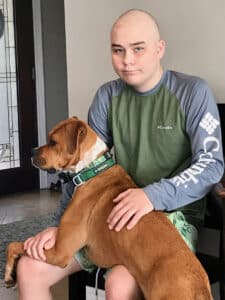
Boden Clark with his dog, Denali, when he was undergoing treatment.
His family moved to the area in October 2019, just a few months before his diagnosis. He attended Lewis and Clark High in Spokane as a freshman.
He was diagnosed in mid-February 2020. The World Health Organization officially declared COVID-19 a pandemic on March 11, 2020.
There isn’t exactly a good time to start chemo. But Clark may have started it at the worst time.
“It was a lonely road,” he said. “And that was kind of good. I didn’t want people to see what I had to go through. I didn’t want people’s first impression of me to be, sick and dying.”
He received his treatment at Madigan Army Medical Center, a benefit of a family member’s military service.
“It was difficult,” remembered Helgerson. “There were no social services or anything. … Everything else he needed beyond that basic care, it was very difficult to get him into,” thanks to the pandemic.
Side effects
Clark’s treatment regimen included daily oral chemotherapy and weekly infusions. He experienced just about every side effect possible. Extreme nausea and fatigue. Severe headaches. Sores. Pulmonary embolisms. He even got three inches shorter.
A teenager who played two highly physical sports had to get around using a wheelchair.
Even worse, Clark said, were the mental side effects. Sufferers call it “chemo brain” — a term used by patients to describe memory and intellectual problems during and after treatment.
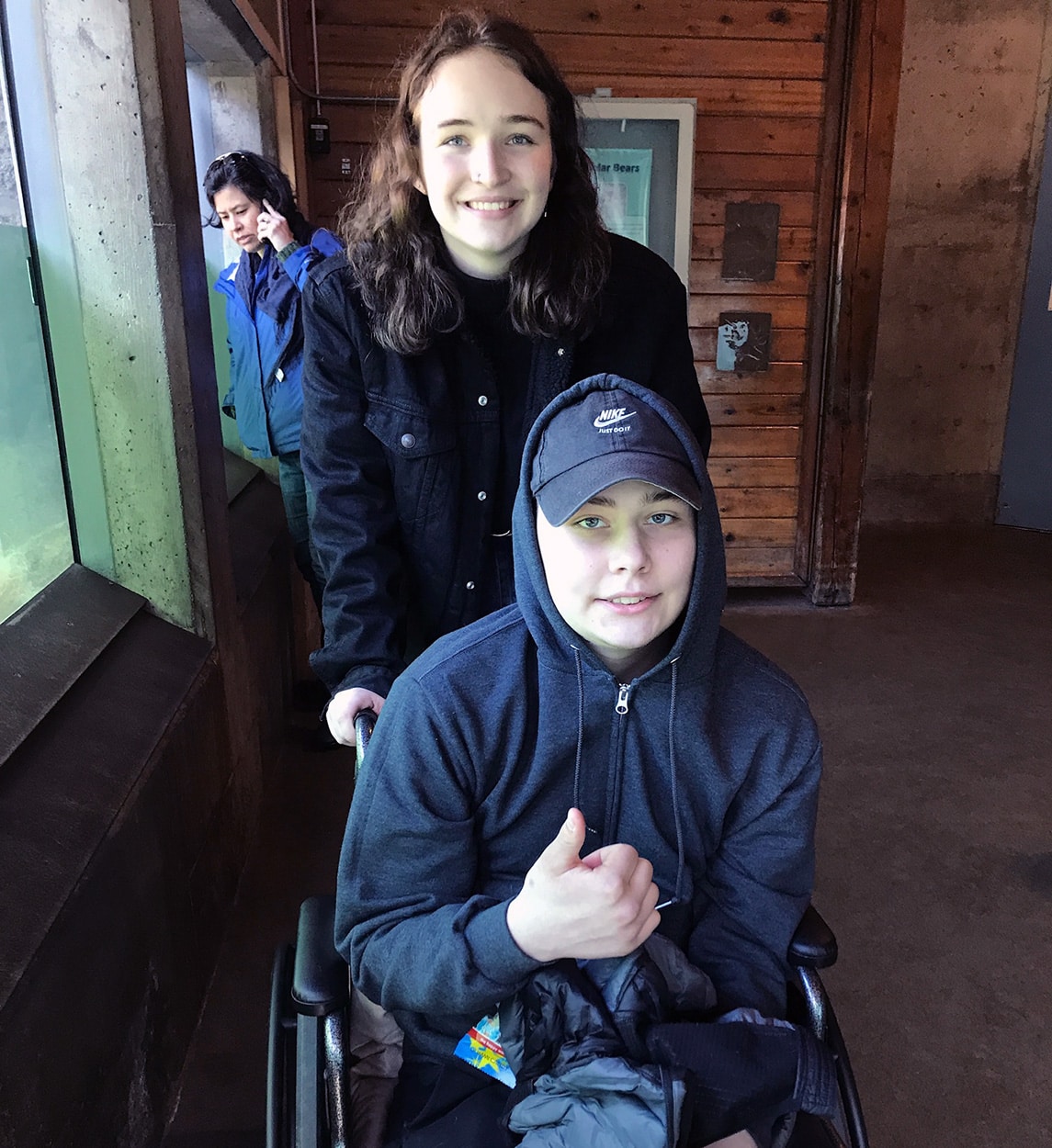
Boden Clark with his sister, Sierra, at Point Defiance Zoo & Aquarium in 2020.
He had a serious case.
He remembers a moment when he couldn’t count to 10. Another time, he couldn’t recall where he was. He and Helgerson watched the same movie together three times and he still couldn’t remember the plot.
At one point, Helgerson said, a doctor prescribed him to play video games. “He was like, your goal is to be able to focus enough, move your hands enough, to finish video games.”
The mental side effects, from which Clark appears to have made a full recovery, were perhaps the hardest part for him.
“I was able to cope with the physical, like, diminishing. You can go to the gym, you can rebuild,” he said. “But my mental state started diminishing and that scared me. Your brain doesn’t heel the way your body does.”
‘They didn’t treat me like I was sick’
Treatment and recovery was a long road. The first task was killing the cancer.
“When I was diagnosed, 98% of my blood was cancer,” Boden said. “So they pretty much restocked me.”
Then came maintenance treatments to make sure it didn’t return. It was a nearly three-year fight.
The dream of returning to the field of play remained an incentive during the treatment phase.
His lacrosse teammates, particularly, did much to keep Clark’s spirits up during treatment. Even though he barely knew them — he was diagnosed before ever appearing in a lacrosse game for the Seahawks.
“They all rallied. It was crazy,” Clark remembered. “The captains that I’d met for like two days were texting me through treatment. They gave me this jersey that was signed (by the team). So I was like, I’ll give them everything I have and not let this team down.
“I’d be OK being like the third-string water boy.”
He managed to rejoin the Seahawks lacrosse team in early 2021, while still undergoing treatment. His performance was uneven due to his conditioning, of course. But he was an inspiration to his teammates, just as they were to him during his illness and recovery.
“They didn’t treat me like I was sick. … I was willing to die on the field to fight for those guys that made me feel like a person again,” Clark said.
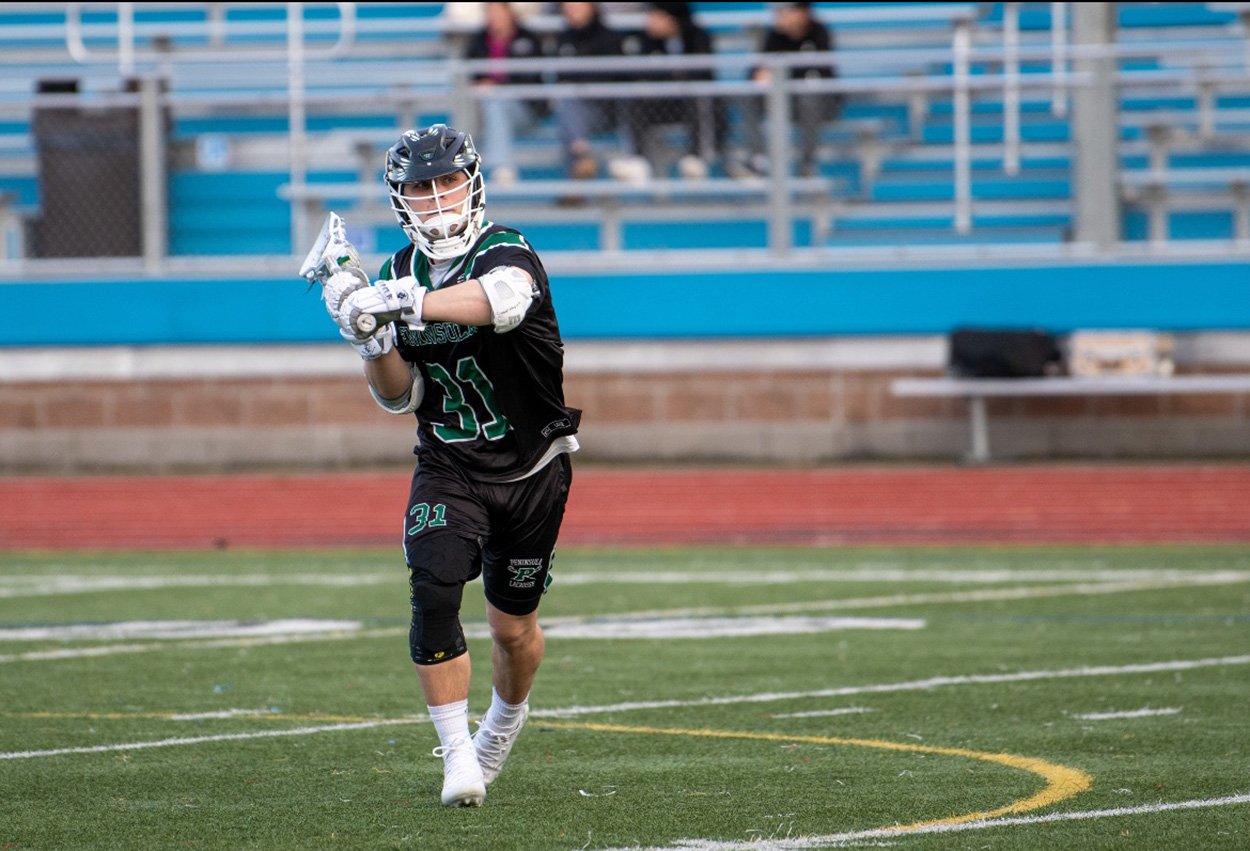
Boden Clark during a lacrosse match earlier this year. Photo by Dani Ackulchin
Mat Classic
Still, wrestling was his first love. Returning to the mat was every bit as important as returning to the field.
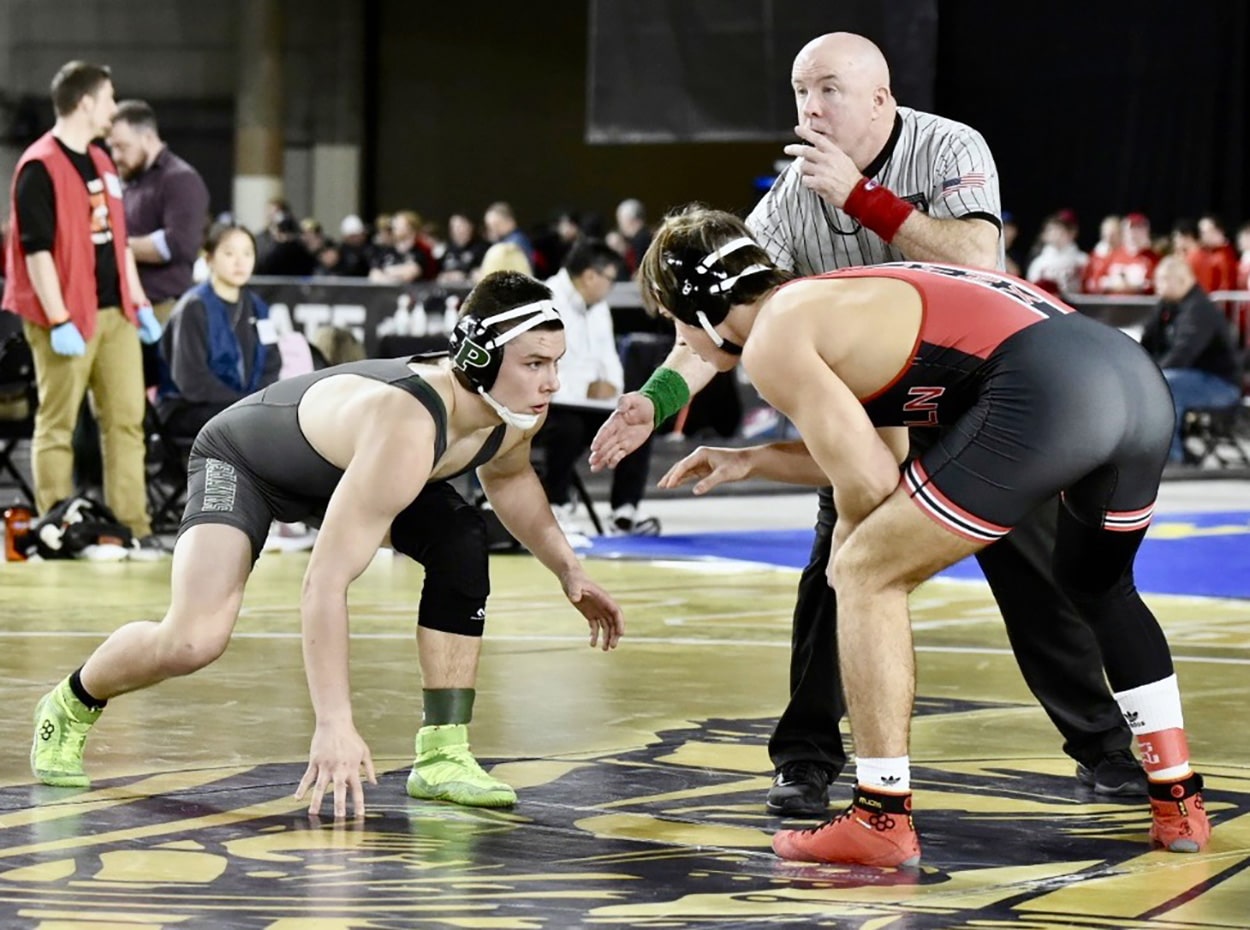
Boden Clark (left) of Peninsula wrestles at Mat Classic 2023. Photo by Leanne Casey
He returned to the Seahawk wrestling team without a lot of expectations. He just wanted to compete.
Clark wrestled this season at 182 pounds and 170 pounds after having competed at 160 and 145 as a sophomore. This despite having lost muscle during his chemo treatments.
He was competitive during the season. Despite starting with low expectations, he started to think he might make state after all.
“His mindset is what gets him through,” Peninsula wrestling coach Gary Griffin said. “The maturity. The thought that, ‘I’ve been through some really awful things. I can make it through this (match).’ ”
Clark qualified for Mat Classic with a fourth-place finish at regionals. He won his first match at state, then lost a match, then had to win five consecutive matches to reach the medal round. He would finish eighth.
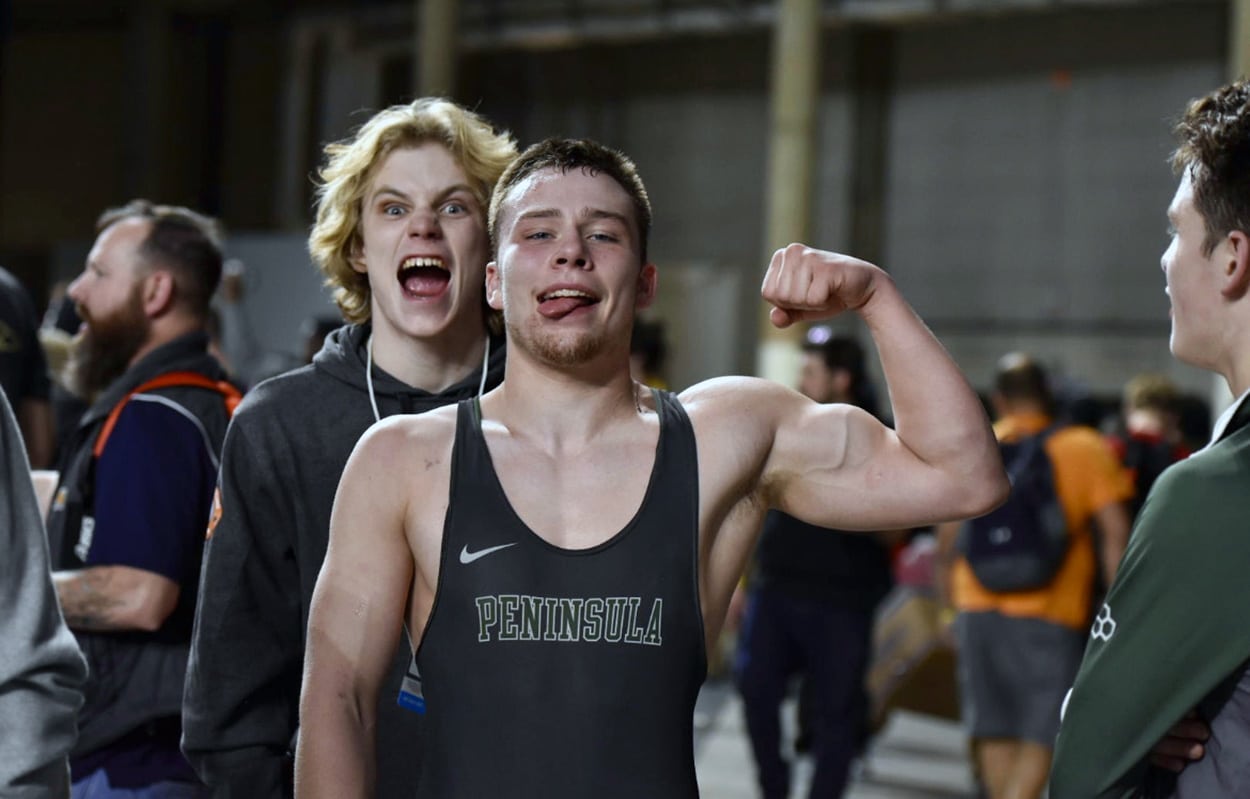
Boden Clark (front) and a teammate celebrate a win at Mat Classic in 2023. Photo by Leanne Casey
“Each one of those matches, they were wild matches,” said Peninsula assistant wrestling coach Mark Nickels, also an assistant principal at the school. “The outcome could’ve been very different if one situation changes. That eighth place easily could’ve been higher.”
Along with a medal, Clark gets his name on a wall in the Peninsula wrestling room with every other wrestler who’s placed at state. His might mean more than any of the rest.
“Some of the tougher things he’s gone through in life … the physical demands of wrestling are kind of nothing compared to going through chemo,” Griffin said.
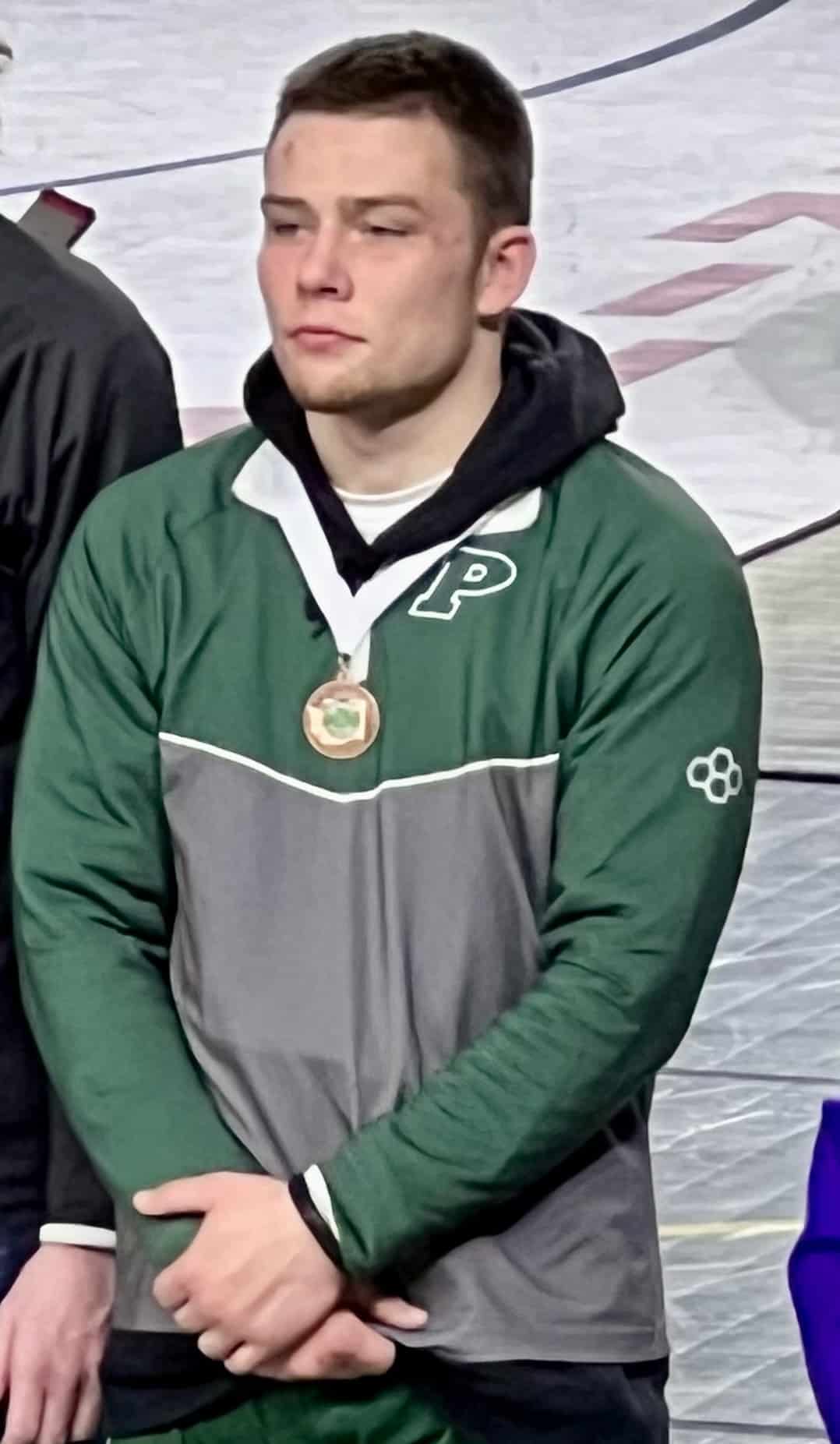
Boden Clark on the medal podium at Mat Classic 2023.
Getting back up
Clark’s athletic future, though, is in lacrosse.
He starred on the lacrosse summer circuit with the South Sound Lacrosse club team. While still in treatment, he got private online tutoring sessions from Jake Withers, a college and professional lacrosse star.
Once his physical conditioning returned, his talent took over. But it wasn’t only the talent that got college coaches’ attention — it was the grit that Purdy is so proud of.
During a summer club tournament in Long Island, Clark said, a college coach contacted him because “of the amount of fight I had.”
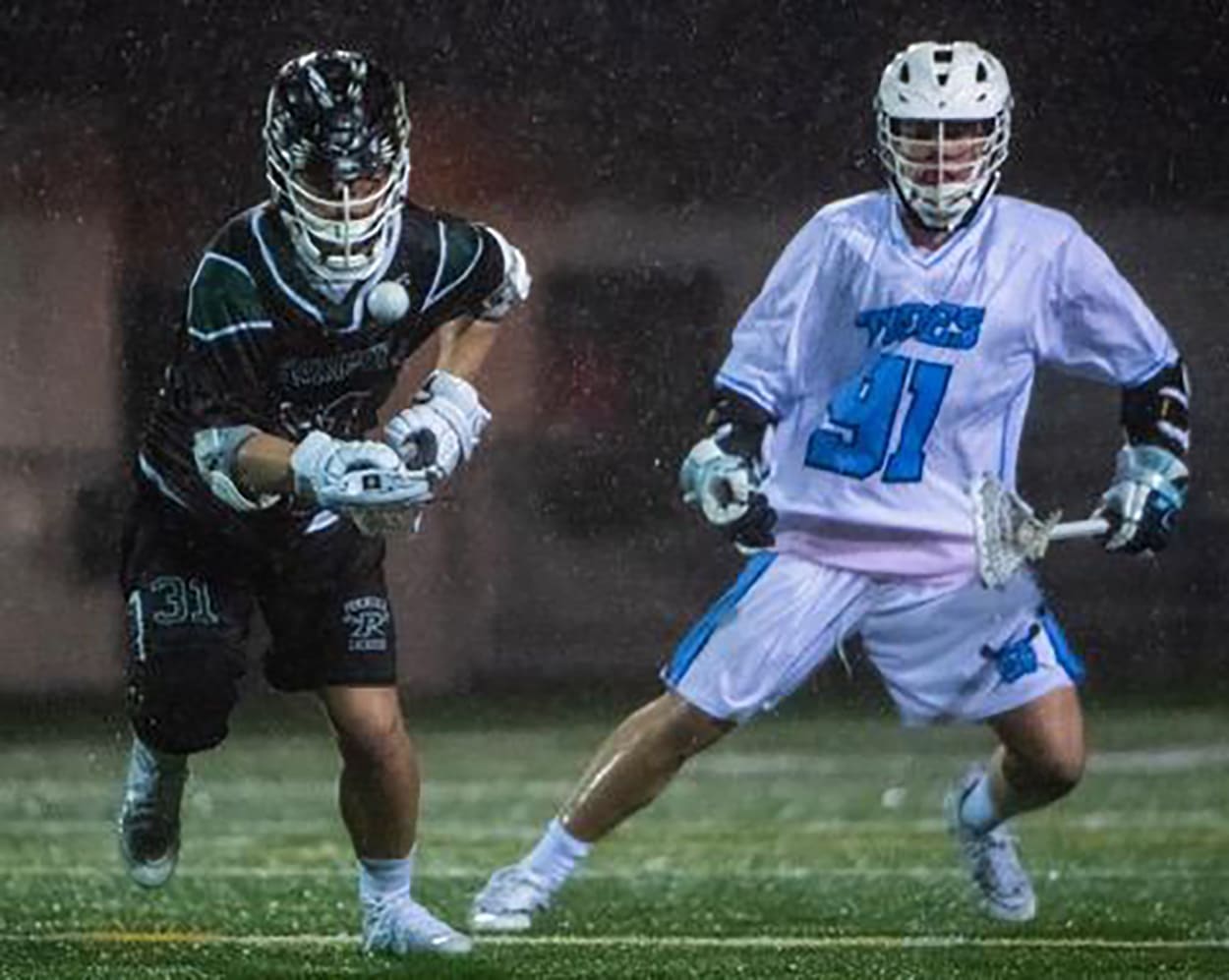
Boden Clark (left) during the first meeting between Peninsula and Gig Harbor earlier this year. Photo by Bryce Carithers
“He said it was because he kept getting back up,” Helgerson said. “Skills can be taught in practice, but you can’t teach people to get back up.”
Getting back up helped Clark secure a spot with the highly-rated Mercyhurst lacrosse team. He plans to study to become an occupational therapist, with dreams of someday working with pediatric oncology patients and becoming an athletic trainer for the Special Olympics.
How to help
Working with a nonprofit called The Light Collective, Clark created a program called Unite to Fight to help teens and young adults fighting cancer. Unite to Fight provides Bo’s Boxes, filled with gifts and items uniquely suited to help young people fighting cancer.
“Simple items such as a nice pillow, soft blanket and noise-canceling headphones might not seem like much, but they made a big difference,” Clark wrote in literature supporting the effort.
Fans who attend the Baggataway Bowl (8 p.m. Friday, April 28) are invited to bring a little extra cash to donate to Unite to Fight. Click here to make an online donation.
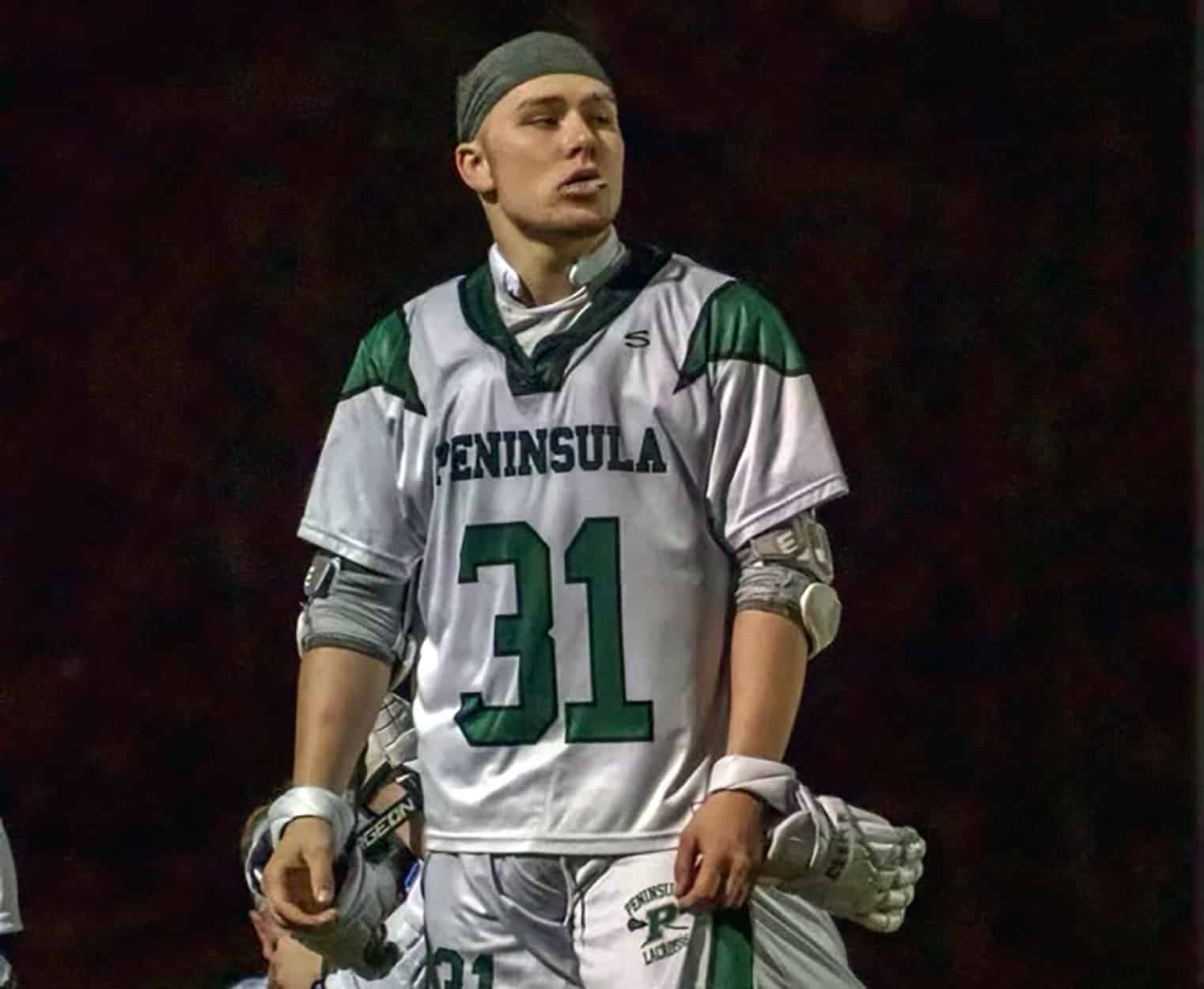
Boden Clark at a Peninsula High lacrosse match this spring. Photo by Dani Ackulchin

